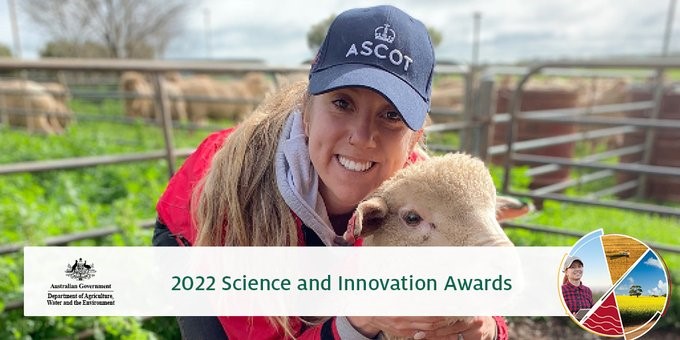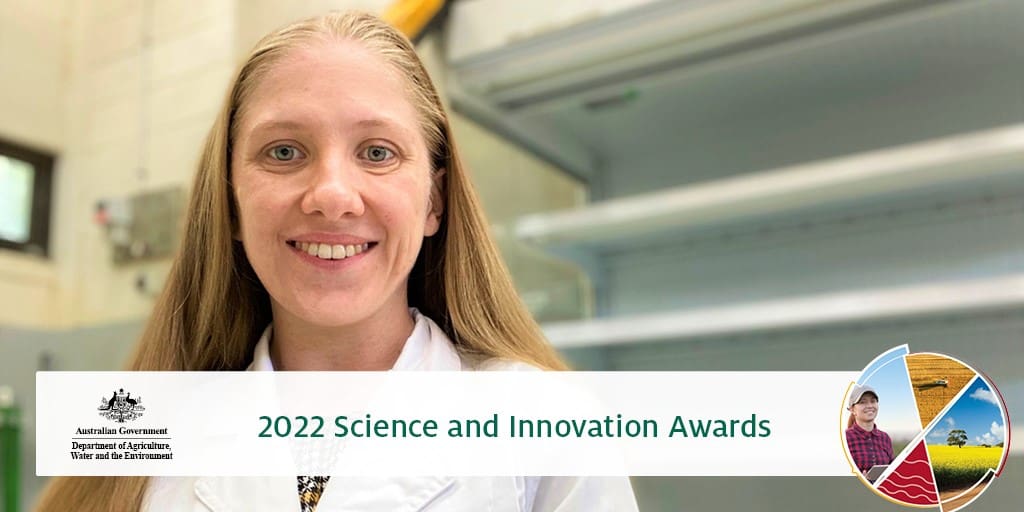
Award winner Bobbie Lewis Baida will study the impact of heat stress on ram reproductive performance.
WORLD-FIRST research into sheep reproduction under climate stress and the impact of residual glycogen on lamb eating quality will be undertaken by two 2022 science and innovation award winners.
Winners of the Federal Government’s 2022 Science and Innovation Awards for Young People in Agriculture, Fisheries and Forestry were announced during the ABARES Outlook conference this week.
Insights into how climate change might affect sheep reproductive performance are expected from the research of Australian Wool Innovation-sponsored South Australian researcher Bobbie Lewis Baida.
And Murdoch University researcher Sonya Moyes, will be enlisting taste testers to help assess the impact of loin residual glycogen on sensory attributes of Australian lamb in research sponsored by the Australian Meat Processor Corporation.
Ram heat stress study is a world-first
Bobbie’s project will focus on scrotal thermoregulation of the ram and the effects of heat stress on reproductive performance. A recent review reported that heat stress around mating costs the Australian sheep industry about $97 million each year, and the University of Adelaide said there is an urgent need to address the issue.
Bobbie said the ram project complements her existing PhD research on the impact of heat stress on ewes where she is using vaginal temperature sensors to monitor the core temperature of ewes in the paddock, linking this to behaviour, ovulation rate, conception rate, foetal growth and lamb birthweight. Adding rams will allow her to collate a complete picture of how climate change will affect sheep reproduction.
“I’ll hopefully be able to tie it all together and address a lot of unanswered questions,” she said.
High testicular temperature is known to reduce the amount of morphologically normal, motile and fertile sperm and with temperatures rising under climate change, Bobbie’s project will enable her investigate how scrotal and body temperature regulation affects semen quality and fertility in Merino rams. The study is the first of its kind to investigate the impact of hot weather in rams on the farm, rather than in climate-controlled rooms.
The temperature of ram testicles is regulated independently, typically sitting at 4–5℃ below the minimal’s core body temperature, and Bobbie will study how hot weather affects this over the 2022/23 summer, using technology designed to continuously monitor scrotal and body temperature with minimal impact on the rams.
“I know for a fact that farmers out there are just trying to make a sustainable living and feed the world in a changing climate,” she says.
Research could lead to a Meat Standards Australia prediction model

Perth-based research Sonya Moyes is undertaking some tasty lamb research.
It’s known in the sheep meat industry that a high pH means poorer eating quality in lamb and one thing that lowers the pH is residual glycogen, which is converted to lactic acid post-slaughter.
If glycogen does turn out to be a strong driver of eating quality, Sonya Moyes said it could be incorporated into a Meat Standards Australia prediction model for sheep meat.
“We already know a couple of factors that need to be in that model in order to predict eating quality.
“But we’re just now going to test if glycogen needs to be included as well,” she said.
The research could also be applied to other industries.
“If we find a big effect in sheep, I think it is definitely something that could be looked at in both beef and pork.”
In her project, everyday consumers will try seven different cuts of lamb, scoring them on tenderness, juiciness, flavour and overall liking.
Sonya said animal scientists suspect that having enough glycogen at slaughter is linked to good eating, but the full story isn’t known.
“We’ve looked back at all papers to the 1980s, and in no species have they really examined the impact of loin residual glycogen on eating quality,” she says.
“So, it’s going to be a bit of a world-first, going and looking at that.”

HAVE YOUR SAY